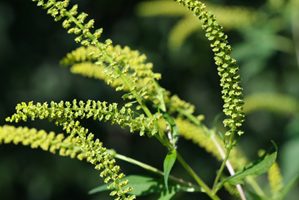
Climate change could actually be making your seasonal allergies symptoms worse than ever.
According to Minnesota Public Radio (MPR) News, the increased carbon emissions that are causing the world's climate to grow gradually warmer are also encouraging plants to produce more pollen. Additionally, higher temperatures means an extended growing season for ragweed along with other allergenic plants. In fact, the ragweed season in Minneapolis is about 16 days longer than it was 20 years ago, and the change is even more dramatic in more northern areas.
Ecologists say that the increased amount of carbon dioxide in the air allows plants to build more proteins, fats and organic compounds, leading them to produce more pollen for a longer length of time. This could be affecting people's allergy symptoms and causing them to suffer to a greater degree.
"Weeds are the ultimate beneficiary of increased carbon dioxide and climate change," an ecologist told MPR, "because they are in fact so well adapted to change to begin with — that's what basically allows them to grow and thrive."
The Minnesota Department of Health recently released a report entitled "Minnesota's Climate and Health Profile and Report," which describes increased allergy problems as one of the most prominent effects on human health that is resulting from climate change.
Here are some of the ways the report predicts climate change will impact our health in the future:
- Vector-borne diseases: Wetter, warmer conditions enable vectors for disease, such as mosquitos, to thrive. This could be contributing to the increased number of Lyme disease and West Nile virus cases seen in Minnesota over recent years.
- Poor air quality: According to MPR, the burning of coal and fuel has increased the concentration of carbon in the atmosphere by 25 percent in the past 50 years. There is also more airborne pollen floating around as the result of the warmer temperatures, exacerbating seasonal allergies and respiratory difficulties in allergy sufferers and asthmatics.
- Questionable water quality: With global warming, meteorologists are predicting heavier rains and increased flooding. This could lead to water contamination problems.
- Agricultural changes: Heat and increased rainfall will definitely have an impact on crops, possibly encouraging certain pests and weeds to grow at the expense of other food staples.
"It's sort of a burden on the whole health care system," one St. Paul allergist told MPR. "People are more sick, seeking more emergency care. It can have a lot of long-term consequences that I don't think people are always aware of."
However, allergists also say that there could be other explanations for the increased bout of allergies we've been seeing in recent days. Some say the overuse of antibiotics is contributing to the symptoms, as is the habit of spending too much time indoors.
If you suffer from allergies and are looking for allergy solutions, contact Allergy Be Gone today!









